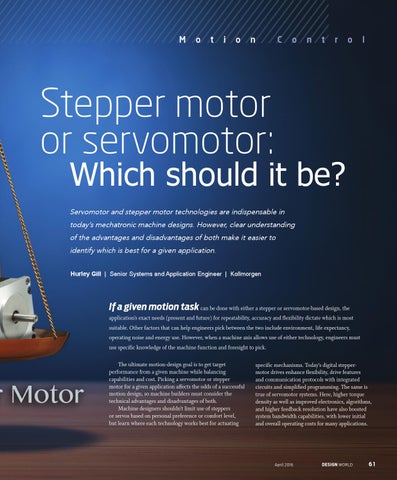M
o
t
i
o
n
C
o
n
t
r
o
l
Stepper motor or servomotor:
Which should it be? Servomotor and stepper motor technologies are indispensable in today’s mechatronic machine designs. However, clear understanding of the advantages and disadvantages of both make it easier to identify which is best for a given application. Hurley Gill | Senior Systems and Application Engineer | Kollmorgen
If a given motion task can be done with either a stepper or servomotor-based design, the application’s exact needs (present and future) for repeatability, accuracy and flexibility dictate which is most suitable. Other factors that can help engineers pick between the two include environment, life expectancy, operating noise and energy use. However, when a machine axis allows use of either technology, engineers must use specific knowledge of the machine function and foresight to pick. The ultimate motion-design goal is to get target performance from a given machine while balancing capabilities and cost. Picking a servomotor or stepper motor for a given application affects the odds of a successful motion design, so machine builders must consider the technical advantages and disadvantages of both. Machine designers shouldn’t limit use of steppers or servos based on personal preference or comfort level, but learn where each technology works best for actuating
Motion Control Kollmorgen 4-16_Vs6.LE.MD.indd 61
specific mechanisms. Today’s digital steppermotor drives enhance flexibility, drive features and communication protocols with integrated circuits and simplified programming. The same is true of servomotor systems. Here, higher torque density as well as improved electronics, algorithms, and higher feedback resolution have also boosted system bandwidth capabilities, with lower initial and overall operating costs for many applications.
April 2016
DESIGN WORLD
61
3/31/16 3:55 PM
